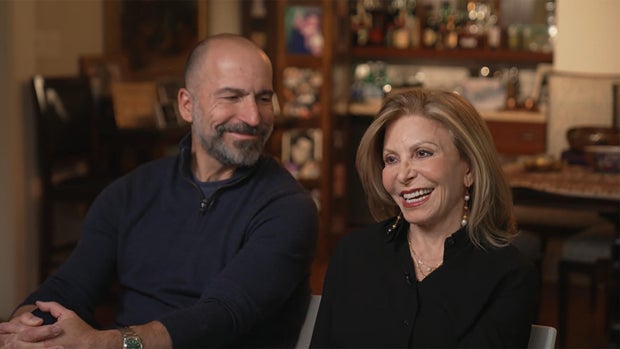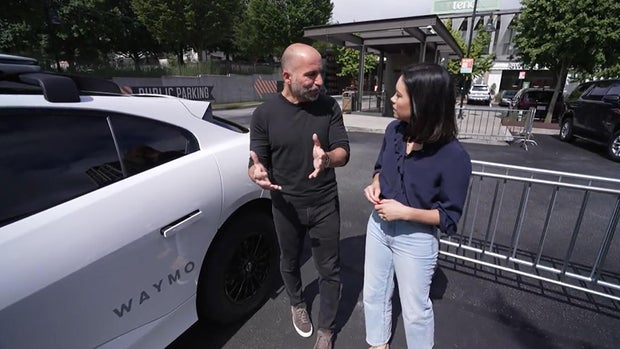Uber CEO Dara Khosrowshahi on being behind the wheel

It's rare to sit down with a CEO and the CEO's mother. The proud mom is Lili Khosrowshahi; her son, Dara, is behind the wheel at Uber as its chief executive. "I actually say he works for Uber," said Lili. "Sometimes I say he drives, he's a driver."
They sat down with us to share their family's immigration story. In 1978, the Khosrowshahis fled Tehran and the Iranian revolution. "We were forced to leave Iran – it wasn't our decision," Lili said. "It was done in a day."
Dara's father ran a family business which made them wealthy, but also, they say, a target. "You don't sit around saying, 'Well, let's plan as a family for a revolution,' right? It just never occurs to you," Dara said. "We lost everything."
"We came from a much better life to a smaller life," said Lili. "At the time, coffee was 15 cents, and I wouldn't even buy a cup of coffee. In fact, I don't pay for Starbucks coffee to this day."
"Mama, Starbucks is a customer of Uber Eats. You gotta talk it up!" Dara interjected. "I love Starbucks, personally!"
"I'll let you pay," said Mom.

It's that easy-going, yet strategic tone that Khosrowshahi brought to Uber. Launched in 2009, the company transformed how millions get around. When Khosrowshahi took charge in 2017, Uber was infamous for a toxic work culture and a growth-at-all-costs approach.
When he took over, his job was described as "one of the worst clean-up jobs in the history of American capitalism."
"Well, I think it was a little over-dramatized," said Khosrowshahi. "But it was true that I had to come in and change the culture of the company. And I do think that the company, in hindsight, was too aggressive in certain ways. And I think now we get it right more than we get it wrong."
Still, Uber is defending itself in lawsuits over its billing practices and passenger safety.
Then, there's the company's relationship with President Donald Trump. Eight years ago, Khosrowshahi was CEO of Expedia – and condemned Mr. Trump's so-called Muslim ban. Today, he's one of many CEOs now engaging with President Trump.
"I do think that, as a CEO of a U.S. company, you want the country to succeed," Khosrowshahi said. "And so, that means supporting whatever administration is in power. You're gonna have your disagreements. You're gonna have your agreements. We have to navigate through a period of a strong economy, but at the same time, significant uncertainty."
I asked, "Isn't a lot of that uncertainty caused by this president?"
"Uncertainty comes with change," he replied. "And I think the president ran on a mandate for change. As CEOs, as companies, you know, we have to adjust to that environment that we see."
And Uber is adjusting. Last month it announced new, cheaper ride options. Route Share matches riders with other passengers along pre-set commutes.
"This feels kind of like a glorified carpool?" I asked.
"Well, what is old is new again," said Khosrowshahi.
"We have heard from a lot of riders that Uber rides have gotten a lot more expensive over the past few years, more than the rate of inflation – what's happening here?"
"Well, I think it is about inflation," Khosrowshahi said. "And the average Uber ride is now a little over $20. Our drivers need to make a living, and so really the demand for drivers and pay has gone up, and that translates into the ultimate price of the Uber ride."
Concerns over driver pay and benefits persist … even as Khosrowshahi's own compensation has surged, to about $40 million a year.
Asked what people should make of that, Khosrowshahi said, "We as a society, I think as a country, clearly, we've done unbelievably well economically. But I do think that the inequality that you see as it relates to the top end compensation, like someone who's lucky enough like me, and the middle class, et cetera, that is too big a chasm, in my opinion."
Too big of a gap? "Yeah. I do think it's too big of a gap. Now, I don't have a solution for it."
It's a gap that may be getting even bigger.
This past week, Uber expanded its robotaxi service to Atlanta, launching rides in self-driving Waymos.
Khosrowshahi said, "Everyone wants on-demand transportation, food, et cetera. So, we see actually AV [Autonomous Vehicle] and human driving can grow for the next five to 10 years."
"You don't think human driver numbers will decrease?" I asked.
"Not in the next five to 10 years," he replied. "Then, we will need to adjust as a society."
For now, robotaxis are neither cheaper nor faster than a human driver. But Khosrowshahi says they are as safe as can be. "Certainly the statistics bear it out," he said.

Khosrowshahi is focused on the road ahead, but his past is never far behind. When he was a teen, his father returned to Iran for what he thought would be a short visit … but the government wouldn't let him leave.
Lili said, "For the six years that your father was away, you never even mentioned his name. And I told you that Daddy was free to come, and you started crying like crazy. I mean, you couldn't stop crying. So, you know, you had learned to just hide your feelings. But as immigrants, we all learned to hide our feelings."
Emotional, Dara requested a break from the interview. "I don't remember the particular moment," he said. "but I remember the time. And I think, you know, Mom's totally right. You adjust to the situation to your best."
"Adjust" … Dara Khosrowshahi keeps coming back to that word, in work and in life.
I asked, "You have said, 'We came at a time that was welcoming to immigrants.' Is that still the case right now?"
"I think, you know, we're going through a transition now as a nation," he replied. "There's a reset going on in terms of making sure that immigration here is proper, is legal. It's difficult for a lot of people. But my hope is that we remain the kind of country that attracts the best and the brightest who want to build a life here. And hopefully, I can help others live the same dream that I have."
For more info:
Story produced by Dustin Stephens. Editor: Joseph Frandino.
Journalist Jo Ling Kent joined CBS News in July 2023 as the senior business and technology correspondent for CBS News. Kent has more than 15 years of experience covering the intersection of technology and business in the U.S., as well as the emergence of China as a global economic power.
Cbs News




